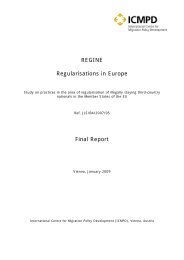taxud/2414/08 - European Commission - Europa
taxud/2414/08 - European Commission - Europa
taxud/2414/08 - European Commission - Europa
Create successful ePaper yourself
Turn your PDF publications into a flip-book with our unique Google optimized e-Paper software.
- Under Article 46 of Directive 2006/112/EC as amended by Council Directive<br />
20<strong>08</strong>/8/EC 12 and applicable from 1 January 2010, the place of supply of services<br />
rendered to a non-taxable person (B2C) by an intermediary acting in the name<br />
and on behalf of another person shall be the place where the underlying<br />
transaction is supplied.<br />
Against this background the <strong>Commission</strong> services have arrived at the conclusion that an<br />
option for taxation being with the economic operator could work in practice where the<br />
following conditions are fulfilled:<br />
- The right to exercise the option should be with the supplier who must be able to<br />
behave like any other ordinary economic operator supplying taxable services;<br />
- the option should either be irreversible or at least binding for a longer period for<br />
preventing unnecessary administrative costs for fiscal administrations;<br />
- exercising the option should lead to a situation where the entire business activities<br />
of the taxable person concerned become taxable, allowing to identify – in<br />
particular in cross-border scenarios - without doubt, that taxable services are<br />
supplied;<br />
- there should be an additional reporting mechanism in Article 226 No 11 of<br />
Directive 2006/112/EC which ensures that the invoice clearly shows that the<br />
supplier has opted for taxation (with registration no), supplies fully taxable<br />
services and the reverse charge mechanism applies. One might also consider an<br />
additional exchange of information between the Member States.<br />
- One might consider an additional joint liability of the supplier for VAT, where he<br />
fails to comply with his invoicing and reporting obligations.<br />
(ee) Cost-sharing<br />
The second solution respecting the principle of tax neutrality was co-operation on a cost<br />
sharing basis. This approach has absolutely nothing to do with VAT grouping according<br />
to Art. 11 of the VAT Directive (despite similar names in some languages)! Basically it<br />
just allows a group of economic operators to pool their investments.<br />
Example 8: Three insurance companies need new software tools to comply with new<br />
regulatory requirements. They establish an independent group. This group buys the<br />
software with VAT from an independent provider. The software is then re-distributed<br />
from the group to its three members; each member will pay 1/3 of the price for the<br />
software. In fact the group itself will not charge any VAT to its members. Where the<br />
corresponding Member States agree, the group and one or more of its members can be<br />
established in different Member States.<br />
The following reasons have motivated the <strong>Commission</strong> services to propose this solution:<br />
12 OJ L 44 page 11 of 20.02.20<strong>08</strong><br />
13
















